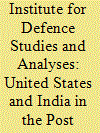| Srl | Item |
| 1 |
ID:
115890


|
|
|
|
|
| Publication |
2012.
|
| Summary/Abstract |
The article proposes to trace India's relations with Iran in the post-Cold War period, to identify the highs and lows in its contours and analyse the current situation. No country, however powerful, can formulate and implement its policy towards another in a total vacuum. India's Iran policy, as well as its foreign policy on the whole, reflects its domestic and external concerns and compulsions. India's need to secure its interests and broaden its options is unexceptionable. However, abstaining on Iran's nuclear issue and declining to launch the Israeli spy satellite to monitor Iranian territory would have been well within India's interests and external expectations.
|
|
|
|
|
|
|
|
|
|
|
|
|
|
|
|
| 2 |
ID:
005760


|
|
|
|
|
| Publication |
New York, St. Martin's press, 1994.
|
| Description |
xv,278p.
|
| Standard Number |
0312099576
|
|
|
|
|
|
|
|
|
|
|
|
Copies: C:2/I:0,R:0,Q:0
Circulation
| Accession# | Call# | Current Location | Status | Policy | Location |
| 035827 | 327.172/KEG 035827 | Main | On Shelf | General | |
| 037142 | 327.172/KEG 037142 | Main | On Shelf | General | |
|
|
|
|
| 3 |
ID:
140730


|
|
|
|
|
| Summary/Abstract |
What explains the Japan–South Korea security relationship in the post-Cold War period? This article highlights the impact of the conflict and convergence of identity factors vis-à-vis external factors (such as the North Korean military threat, the regional presence of US forces, and growing Chinese power) to offer a more comprehensive explanation of the ebb and flow of security cooperation between Japan and South Korea. This article argues that in some cases, the identity factors affect security cooperation more than external strategic factors. Based on three in-depth case studies, the article provides an empirical examination of how identity factors have affected the overall pattern of Japan–South Korea security relations since the 1990s. The analysis will have important implications for our understanding of the role of identity factors between Japan and South Korea, as well as envisioning the possibilities of regional security cooperation in the future.
|
|
|
|
|
|
|
|
|
|
|
|
|
|
|
|
| 4 |
ID:
002965


|
|
|
|
|
| Publication |
Singapore, Institute of Southeast Asian Studies, 1993.
|
| Description |
xix, 144p.
|
| Standard Number |
9813016361
|
|
|
|
|
|
|
|
|
|
|
|
Copies: C:1/I:0,R:0,Q:0
Circulation
| Accession# | Call# | Current Location | Status | Policy | Location |
| 034694 | 355.3432/BAL 034694 | Main | On Shelf | General | |
|
|
|
|
| 5 |
ID:
003096


|
|
|
|
|
| Publication |
Washington DC, National Defence University, 1993.
|
| Description |
198p.
|
|
|
|
|
|
|
|
|
|
|
|
Copies: C:2/I:0,R:0,Q:0
Circulation
| Accession# | Call# | Current Location | Status | Policy | Location |
| 034741 | 327.73054/UNI 034741 | Main | On Shelf | General | |
| 034953 | 327.73054/UNI 034953 | Main | On Shelf | General | |
|
|
|
|